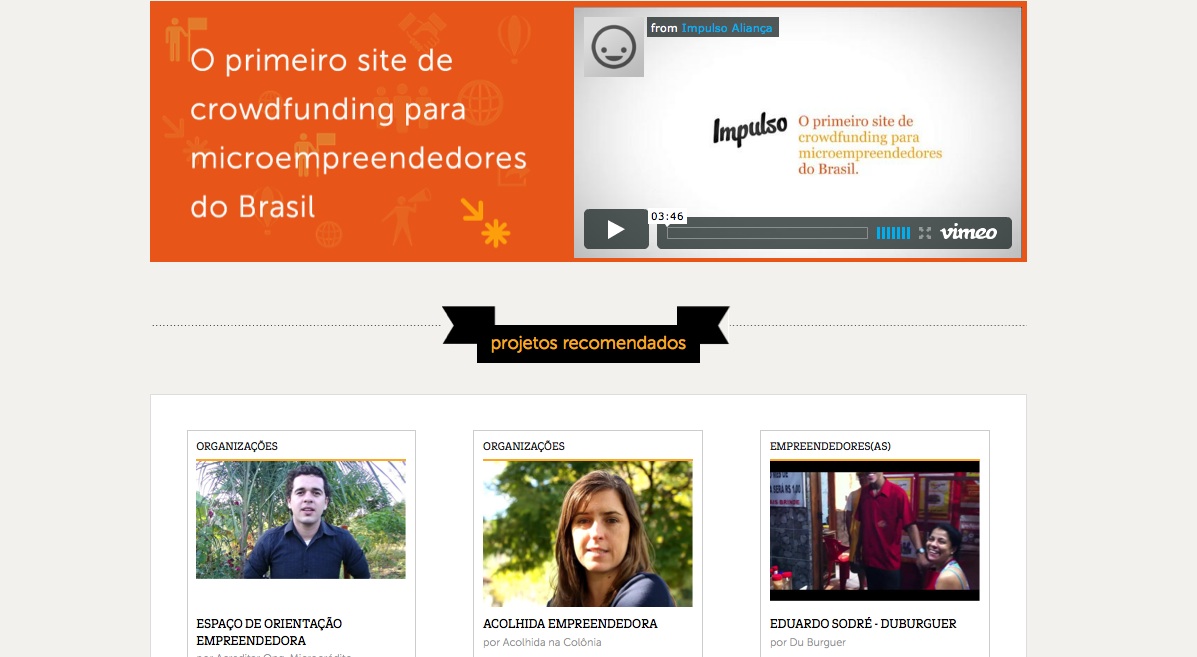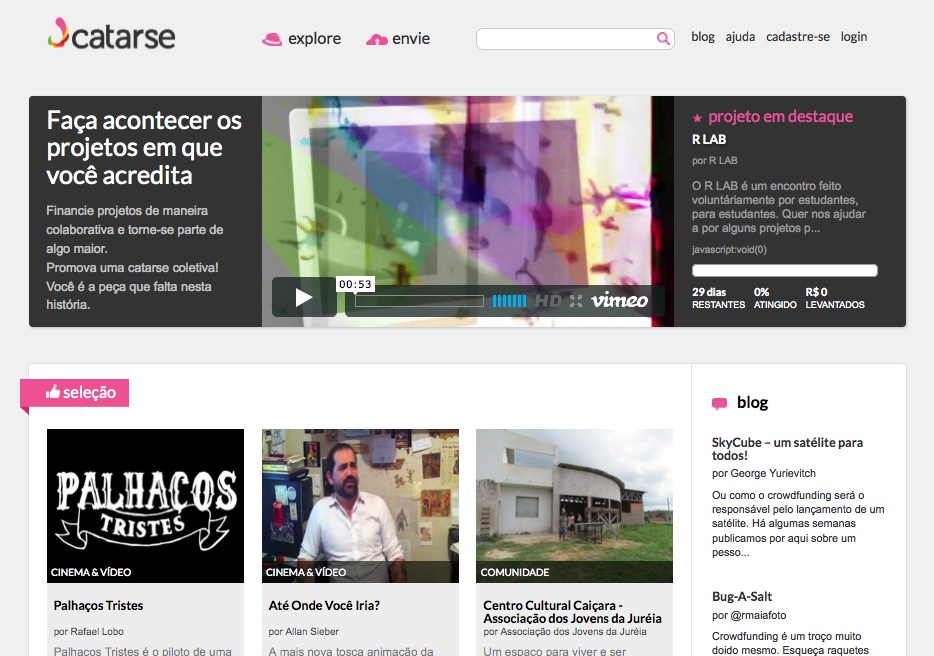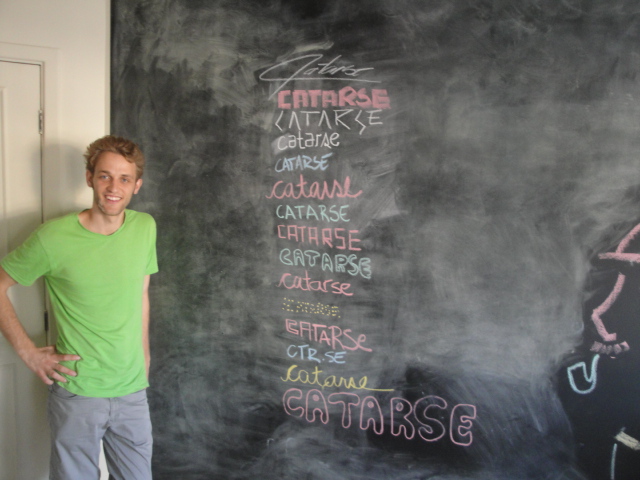In January and February of this year, entrepreneur Joel Finningley traveled in Argentina and Brazil to study emerging crowdfunding organizations and models in Latin America. While crowdfunding is not as widespread there as it is in the United States, it is a quickly expanding field, and points towards a new model for social change and entrepreneurship in these countries. Joel wrote about his experiences on his website, My Crowdfunding Study. Vinicius Braz Rocha and Michel Bauwens interviewed Joel via email about what he learned on his travels, and what the future of crowdfunding in Latin America might look like.
Vinicius and Michel: You just returned from an interesting trip in Latin America, looking specifically at crowdfunding in Brazil and Argentina. Tell us a little more about your motivation and the key insights you came home with.
Joel: The motivation I had for My Crowdfunding Study was to take two things that I loved, crowdfunding and Latin America, and combine them into one trip.
My passion for crowdfunding was born out of my own frustration with the current financial ecosystem, which I saw as very vertical and hierarchical. When I first came across crowdfunding, it felt like it was the moment I had been waiting for. I thought, wow, this could be the catalyst for a whole new financial ecosystem, so I decided to start studying it in depth.
My love for Latin America, on the other hand, was born while I was on a foreign exchange in 2006 in Buenos Aires. It was the first time I felt really connected to a culture and country as a whole, and I had the time of my life. I knew I would return one day, I just didn’t know when. It was a combination of needing to get back to Argentina and wanting to get my first real taste of Brazil that made me decide to go. I wanted to study crowdfunding in a place where it would be a natural fit with the culture, and I believed Brazil would be that place. I was unsure what it would be like in Argentina, but given the huge amount of creativity there I thought it would be worth digging into.
The key insight that I left with was that crowdfunding is going to play a major part in shaping the future of Latin America. In Argentina, I believe crowdfunding will help the people unite around important cultural and social projects, and inspire more Argentines to take the entrepreneurial path. In Brazil, I believe it is a much bigger story. Brazilians love to participate in collective ideas, and the young generation in particular is teeming with entrepreneurial energy and new ideas to help redefine the Brazilian society on every level; therefore, I think we will see a lot of ‘wow’ projects coming out of Brazil in the coming years.
Can you report on any particular success stories? My own attention was peaked with the cultural funding site Catarse, and how they helped finance a documentary featuring native voices against the building of the Belo Monte dam.
I would say that the Belo Monte project is the biggest success story to date in Brazil. Essentially, Belo Monte is a proposed hydroelectric dam to be built on the Xingu River in the Amazon region of northern Brazil. A group of filmmakers went up to the area in 2011 and interviewed people on all sides of the issue, including indigenous peoples, environmental scientists and Brazilian politicians, in an effort to inform the public of the project’s potential impact. To edit and produce the film required them to raise 114,000 Reais (approximately $70,000 USD at the time). They turned to Catarse, Brazil’s leading crowdfunding platform, where they were able to raise what was a record amount (over 140,000 Reais from almost 3,500 people) in a record time period (30 days) for Brazil. The film was released on the Internet two months ago, and already has over 100,000 views on the Portuguese YouTube version alone. It is an incredibly powerful film and it shows how to use crowdfunding as a strategic tool (here it is with english subtitles) to bring important societal issues into public discussion. Last month, a Brazilian judge ordered the project halted until further review. That decision was subsequently overturned last week, but it still goes to show the impact these types of crowdfunding projects can make.
On a smaller level, I met a lot of young entrepreneurs who had raised smaller amounts (ie. 5,000 Reais) to get their ideas off the ground. These include projects such as social tourism, art installations and cultural magazines. While these projects may seem small, when you have a lot of them coming to fruition at the same time it has a big effect.
The story that was developing while I was there was the use of crowdfunding for Brazilian entrepreneurs in low-income communites. During my trip to Curitiba (in Southern Brazil) I tagged along with a team from Aliança Empreendedora to meet two entrepreneurs who had raised funds using Aliança’s Impulso platform, which functioned like Kiva. I could see tears in the eyes of these entrepreneurs as they talked about the impact that those funds had on their lives. Recently, Aliança launched the Impulso crowdfunding portal, which will allow them to scale their impact to a whole new level. In fact, the first project was funded last month!

Did you notice any particular differences between these two countries? And what about the general difference between Europe and Latin America?
The differences are quite profound between Argentina and Brazil. The people of Argentina are really creative and vibrant, but they operate in a culture of constant uncertainty created by the political and economic situation. The result is a less cohesive culture; therefore crowdfunding is not gaining traction as quickly as it is in Brazil.
In Brazil, the crowdfunding movement is really beginning to take off. The people there have an amazing energy to them and are very collective in their endeavors. Despite the social problems, which are profound, Brazilians are persistent and united in their efforts to resolve them. It is this ‘todos juntos,’ or the we-are-all-in-this-together mentality, that I think is the reason there is so much more growth there.
I have noticed a few differences between crowdfunding in Europe, Latin America and the US. I think that Latin America is where crowdfunding is happening in its purest form, as the majority of people are backing the projects because of their collective benefit to society. In the US, many of the projects revolve around the release of new products and many have gotten funded at levels of 500%, 1,000%, 2000% of what they asked for, showing that people are more incentivized by the reward itself. Very few projects in Latin America get funded at these levels. As for Europe, I think it is somewhere in between, as there is a mix of sites that cater more to the collective and others that function like European Kickstarters. It will be interesting to see how these markets evolve over time, but those are my initial impressions.
If we understand crowdfunding as a cloud in the crowdsourcing ecosystem, social capital emerges as the main driver to fund cocreative initiatives, micro innovations and change local grassroots realities. So, taking into account the huge set of economic and cultural differences between Argentina and Brazil, did your study capture this happening in a P2P physical basis? If so, where and how?
I agree that social capital will become the main driver of these types of initiatives, but I see crowdfunding as the main catalyst in this transition to this 'social capitalism' system (for lack of a better term). In the long run, I think it will become another cloud in the ecosystem, but at the moment I think it provides the spark to take a lot of these 'crowdsourced initiatives' from idea phase to action. Not to say it is more important, but I just don't think crowdsourced initiatives at any level can build sustainable momentum without a way to fund themselves.
I think that the economic-culture differences between Argentina and Brazil are quite large and do shed quite a bit of light on how their P2P ecosystems are emerging. With regards to a physical P2P culture, one example which elucidates the differences between the two countries is that the AirBNB community in Argentina is basically non existent, while I used AirBNB for almost my entire trip in Brazil and with great success. In relation to crowdfunding, I think that everything that Catarse is doing is a level above what Idea.me [the major Argentinian crowd-sourcing platform] is doing, and I believe it primarily relates to cultural factors.
Do you have any thoughts about the future of crowdfunding, social enterpreneurship, and the larger sharing culture that seems to be emerging everywhere?
To me crowdfunding is the fundamental driver of the new financial ecosystem. It is not only a new way to fund businesses and creative projects, but also a way for organizations and everyday people to harness their social capital and bring new ideas to life across every sector of society.
As for social entrepreneurs, I think they will be the ones who step up and solve the majority of our social and environmental problems, not governments. Given the scale and magnitude of the social and environmental challenges globally, I think that social entrepreneurs will become the most sought-after commodity in our societies once people start to see their ability to generate rapid-scale impact. I think crowdfunding will be an important tool for people launching social ventures, as it will help them generate community awareness and move towards the creation of self-sustaining enterprises.
In regards to the sharing culture, I think that it will help bring back the fun to our society. I just don’t see how it is any fun to sit in a big house by yourself and own all this stuff for your exclusive benefit. Sharing is a natural human instinct, and somehow we have forgotten how to share in the quest for individualistic aspirations. Sharing and collaboration go hand in hand, so I think we will see people start smiling again once they realize there is an infinite number of fun projects they can become participants in.
Vinicius: Recently here in Rio de Janeiro we had an unconference to discuss how the emergent crowdfunding Brazilian platforms are mostly crude copycats of KickStarter, notoriously run by fees (5%) over all-or-nothing funding. It became obvious that the main backers in Brazil are from urban middle-upper classes of brazilian society and that social grassroots projects/initiatives are minimal – did you perceive that in your studies?
First of all, I did perceive this while I was there, but I’m not sure the exact extent that it’s true. I think it makes sense because technology is a big part of the crowdfunding equation, and from what I’ve heard, internet access and technology education is a big issue in Brazil's lower-income communities.
When I talked to Luis at Catarse, he told me that the people who really understand crowdfunding and are buying in are the youth. In this context, I think that the socio-economic background becomes less significant, as the youth that I met in Brazil wanted to do as much as they could to break down these socio-economic barriers, and I think crowdfunding is a very good way to do that. I think the intentions of the people are best reflected in projects like Pimp my Carroça and Belo Monte which are giving a voice to the people at the bottom.
I think further examples of organizations who can break this trend include:
- Organizations like Aliança in Curitiba who just launched their Impulso platform and who have deep connections with youth in low-income communities. I talked to Lina Useche about this, and she said that all of the youth in the favelas had cellphones are were really well networked. This is definitely a building block to bring crowdfunding into these communities
- Social enterprises like Solidarium. Tiago Dalvi, the founder, has crowdfunding on his radar to help propel more of Brazil's poorest people to become artisans and pave their own way out of poverty. The idea of a Catarse (or another Brazilian crowdfunding site) and Solidarium partnership is one that I floated out there during my study, and I think it has a lot of potential.
- One project on Catarse right now shows evidence of these trends making their impact on the poorer communities. In it, the community is raising money on Catarse to support the creation of their own currency.

Vinicius and Michel: What are the future plans for your own life and career. Did that trip spur a new direction or some new ideas?
At the core I am an entrepreneur, so I plan on applying some of the knowledge that I have gained from my studies to spark new ventures.
As you can probably tell from the previous questions, I am big on Latin America and Brazil in particular. I believe that a part of my future will be in Latin America, but other than that I could see it going a lot of different directions. What I really want is to be part of the young generation of entrepreneurs that works collectively to redefine the way business is done on a global level.
Certainly the trip solidified both my passion for crowdfunding and Latin America. What the trip also did is wake me up to the reality that we are all connected in this world and it’s time to stop sitting on our hands and letting other people dictate our future. It gave me a new perspective on the world and inspired me to get engaged, so it will be interesting to see what ideas will come as a result of this new energy I have.
What can the developed world learn from developing nations about crowdfunding?
I think the developed world can learn a lot from the developing world in this regard.
First of all, many people in the developing world are more collective in their aspirations, which is reflected in many of the crowdfunding projects that we are seeing. It is less of an individual incentive to profit and more of a motivation to create something amazing that many people can enjoy and benefit from. It’s not to say that you shouldn’t profit from something you create, I just don’t think that should be your primary motive for doing it. This seems to be at the heart of a lot of the problems in the developed world.
Because of the cultural and social dynamics, I think the developing world can also teach the developed world about crowdfunding culture. By this I mean creating an environment where everyone can take part in the creation of new ventures and projects in their community. At the core, I think crowdfunding is really about changing the way we think about commerce in our communities, and I think the developing world is moving at a quicker pace in this regard.
What were the most surprising findings in your study?
The biggest surprise was just how many new possibilities are opened up by crowdfunding. There are so many innovative ways it can be applied to solve big problems, and we have only scratched the surface.
I was also a bit surprised at how small of a percentage of the population actually knows about it. I think that when you see something and it makes so much sense to you, you naturally assume that everyone else sees it too. There needs to be a lot of education about crowdfunding to really get the crowds on board.
Joel Finningley is an entrepreneurial young Canadian who loves exploring the planet to study new business ideas. He completed a B'Comm with a specialization in Entrepreneurship before co-founding a company, Lumos For Business, to collaborate with other entrepreneurs on their ideas and research new trends. Vinicius Braz Rocha is the founder of VR Self Media, a p2p network that uses crowdweaving to build entrepreneurship networks in Brazil.









